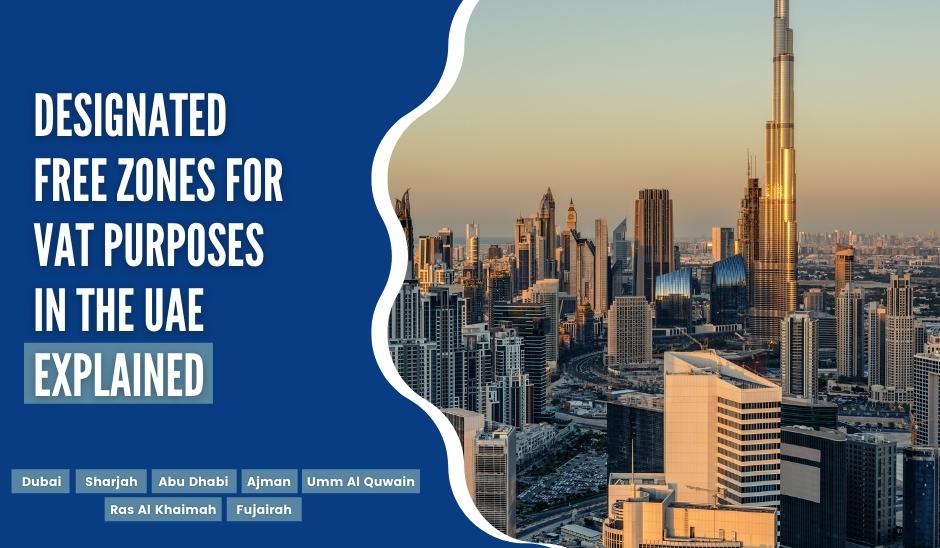“A fine is a tax for doing something wrong. A tax is a fine for doing something right.”
You first chose UAE to be your business destination majorly because it’s a tax-free country (not completely though!). Then you fell for Dubai mainly because the emirate bursts at the seams with expats and tourists giving rise to tons of business opportunities year round. And finally, you preferred one of the 30+ Dubai free zones over the mainland area in the UAE to set up your business essentially because you wanted full ownership of your business plus complete freedom from taxes. Commissioned primarily to scale up international business,free zones or free trade zones in Dubai or any emirates of the UAE basically, are business zones or special economic zones brought into being with the objective of providing tax concessions and customs duty benefits to foreign business persons or investors. Simply put, free zone companies are exempt from any taxes, duties and tariffs – Value Added Tax (VAT), Income Tax, Corporate Tax and Customs – while enjoying 100% ownership of their company until the free zone has been specified as designated free zone for VAT purposes. Yes, not every free zone in the UAE is a ‘VAT Free Zone’. These specific free zones are declared as “designated zones”.
What is VAT Designated Zone in the UAE?
Historically, Free Zones have been excluded from the territorial scope of the UAE. And because the consumption tax, namely VAT, applies to only those goods and services that are supplied within the territorial area of the UAE, free zone entities don’t have to pay VAT until they are trading within the free zones. For VAT purposes, this is not the case as a matter of course. Only those Free Zones that are classified in a Cabinet Decision are eligible for special VAT treatment and that special VAT treatment has certain limitations. These nominated Free Zones are known as Designated Zones for VAT purposes.
In simple terms, Free Zone jurisdictions in the UAE don’t impose taxes on the entities conducting business from here but certain free zones are considered to be outside the state for the purpose of VAT and defined as VAT Designated Zones. These Designated Zones have to comply with special rules for trading products within those Designated Zones in line with the FTA-published Cabinet Decision No. 56 of 2017 on Medications and Medical Equipment, and Cabinet Decision No. 59 of 2017 on Designated Zones for the purposes of the Federal Decree-Law No. (8) of 2017 on Value Added Tax (VAT). In order to qualify for the tax benefits offered by the government, one VAT designated free zone should do business with another VAT designated free zone which means any supplies between designated zones will not attract VAT at 5%. Say, ABC, located in Khalifa Industrial Zone, can supply goods to XYZ, situated in Dubai Textile City, without being subject to 5% VAT. While special rules are applicable to supplies made in the designated zones, the companies set up in such zones may still need to register their business on the UAE VAT system provided the registration criteria is met.
List of VAT Designated Zones
Subject to special rules for supplies of goods within the region, below are the free zones listed by Cabinet decision No. 59 as “designated zones” in the UAE for the purposes of the Federal Decree-Law No. 8 of 2017 on Value Added Tax.
Dubai
- Jebel Ali Free Zone (North-South)
- Dubai Cars and Automotive Zone (DUCAMZ)
- Dubai Textile City
- Free Zone Area in Al Quoz
- Free Zone Area in Al Qusais
- Dubai Aviation City
- Dubai Airport Free Zone
- International Humanitarian City – Jebel Ali
Sharjah
- Hamriyah Free Zone
- Sharjah Airport International Free Zone
- Ajman
Abu Dhabi
- Free Trade Zone of Khalifa Port
- Abu Dhabi Airport Free Zone
- Khalifa Industrial Zone
- Al Ain International Airport Free Zone
- Al Butain International Airport Free Zone
Ajman
- Ajman Free Zone
Umm Al Quwain
- Umm Al Quwain Free Trade Zone in Ahmed Bin Rashid Port
- Umm Al Quwain Free Trade Zone on Sheikh Mohammed Bin Zayed Road
Ras Al Khaimah
- RAK Free Trade Zone
- RAK Maritime City Free Zone
- RAK Airport Free Zone
Fujairah
- Fujairah Free Zone
- Fujairah Oil Industry Zone (FOIZ)
Free Zones Vs. Designated Free Zones
Supplies of goods and services in the UAE territory started attracting 5% VAT after 1 January 2018 except free zones. These are the regions considered omitted from the UAE territory and excluded from VAT. However not all of them. Certain regions that are treated to be outside the UAE for VAT reasons and have special restricted regulations for VAT are the free zones termed as Designated Free Zones. You may find them in the Cabinet Decision document.
Designated Zones and Free Zones have special considerations under UAE tax laws. Let’s take a look at the ways how these two regions differ from one another:
| Parameters | Designated Zones | Free Zones |
| About | Any area specified by a decision of the Cabinet upon the recommendation of the Minister, as a Designated Zone for the purpose of the Decree-Law. | Free zones are geographically bounded areas within the UAE (not all of them are fenced or gated tho) allowing 100% foreign ownership and are by and large, committed to a particular industry. |
| Location | FTA-listed free zones that are assigned to be outside the UAE territory for VAT purposes despite being physically located inside. | Free zones are not considered outside the territory in any circumstances. |
| Taxation | Any supplies between Designated Zones will not attract VAT at 5%. However, Designated Free Zones are dealt differently when it comes to VAT law. 5% tax is applied to the supplies when they are traded between the Designated Zone and the Mainland (UAE). | If a Free Zone is not a Designated Zone, it is treated like any other part of the UAE. Businesses in the free zones, which are not specified as designated zones by FTA, will be taxed at the usual VAT rates. |
| VAT Treatment | Those Free Zones which are nominated as Designated Zones are treated as being outside of the territory of the UAE for VAT purposes for specific supplies of goods. In addition, there are special VAT rules in respect of VAT treatment of certain supplies made within Designated Zones. The effect of these rules is that certain supplies of goods made within Designated Zones are not subject to UAE VAT. In contrast, supplies of services made within Designated Zones are treated in the same way as supplies of services in the rest of the UAE. Supplies made from inside or outside a Designated Zone are free of VAT (with some exceptions). | VAT is a general consumption tax imposed on most supplies of goods and services in the UAE. By default, it is chargeable on supplies of goods and services throughout the territorial area of the UAE. This territorial area will also include those areas currently defined as both fenced and unfenced Free Zones. For VAT purposes, both fenced and unfenced Free Zones are considered to be within the territorial scope of the UAE – and therefore subject to the normal UAE VAT rules – unless they fulfill the criteria to be treated as a “Designated Zone” as defined by the Federal Decree-Law on VAT and Executive Regulations. |
How to Determine a Designated Zone?
A Designated Zone is an area classified by a Cabinet Decision as being a “Designated Zone”. You may refer to the list of Designated Zones in the UAE published under the Legislation tab on the FTA website in order to identify whether a free zone is a Designated Zone. Although an area might be identified as a Designated Zone, it is not automatically addressed as being outside the UAE for VAT purposes until it meets certain criteria. In order for a Designated Zone to be considered as outside the UAE for VAT objectives, the Designated Zone must:
- Be a specific fenced geographic area.
- Have security measures and Customs controls in place to keep track of the entry and exit of individuals and movement of goods to and from the Designated Zone.
- Have internal procedures regarding the method of keeping, storing and processing of goods within the Designated Zone.
- Ensure that the operator adheres to the procedures set out by the Federal Tax Authority. This implies that where a Designated Zone has regions that fulfil the above requirements, and areas that do not fulfil the requirements, it will be treated as being outside the UAE only to the extent that the requirements are met. Furthermore, should a Designated Zone modify the manner of its operation or no longer meet any of the conditions imposed on it which led to it being specified as a Designated Zone by way of the Cabinet Decision, it shall be treated as though it is located within the territory of the UAE.
Companies within a Designated Zone
Free Zones meeting the criteria have been specifically identified by way of a Cabinet Decision as Designated Zones. Those entities which are set up, registered or which have a place of residence within the Designated Zone are deemed to have a place of residence in the UAE for VAT objectives. The effect of this is that where a business is operating in a Designated Zone, it itself will be onshore for VAT purposes, even though some of its supplies of goods may be outside the scope of UAE VAT.
VAT Registration of Designated Zone Entities
Designated Zone businesses are seen as established ‘onshore’ in the UAE for VAT purposes. This means that they have the same obligations as non-Designated Zone businesses and have to register, report and account for VAT under the normal rules. It also means they can join a tax group (VAT group) provided they meet the required conditions. Any entity performing a business activity in the UAE and making taxable supplies more than the mandatory VAT registration threshold (i.e., a taxable person) must register for VAT purposes. Any other person that is making taxable supplies or incurring expenses (which are subject to VAT), in excess of the voluntary VAT registration threshold may register for VAT purposes.
Your VAT Specialist in the UAE
Adam Global is one of the best corporate service providers with 150+ branches all across the world. Whether you have a real estate business, a digital marketing company, an E-commerce firm or a beauty salon in Dubai, for any of your business-related needs in Dubai or any part of the UAE, get in touch with our expert Dubai business formation consultants near you. Zeroed on making your life in Dubai as a foreign business person as easy as ABC, Adam Global, Dubai ensures that you run your business efficiently while complying with tons of UAE rules and regulations. With our team of business specialists by your side, your entrepreneurial journey is free from any stumbling blocks, whether you are an aspiring entrepreneur or an established business professional. From company formation to company registration to finance & accounting management to taxation & audit, to VAT registration & VAT return/refund filing, be it any aspect of business, Adam Global has got you covered.
We trust now you are well aware of what a Designated Zone in UAE is. It’s crucial to stay compliant to VAT laws in the UAE. For more information check out VAT compliance in designated zones. Contact us for theVAT registration & filing services of your designated zone company in the United Arab Emirates. Not only do our Dubai business setup advisors and finance & tax professionals help business persons to incorporate their business in mainland, free zone and offshore areas but also assist them make their in-house finance team VAT ready.



